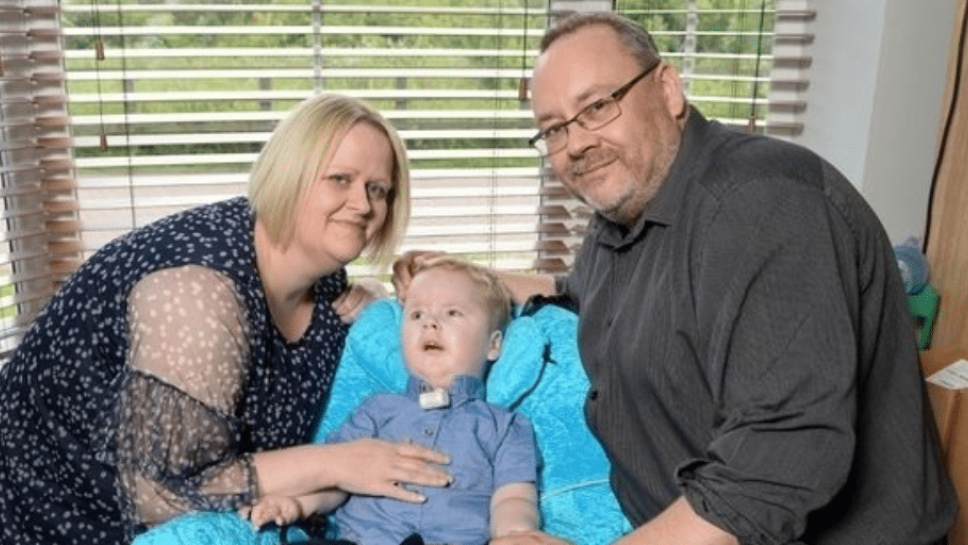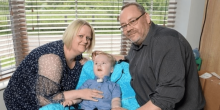
- Drug manufacturer says it can no longer fund Spinraza – the only treatment available for people with spinal muscular atrophy – for babies diagnosed after November with most severe form of condition
- Announcement follows NICE draft decision not to recommend the treatment for NHS use – but charities are encouraged by discussions for a new temporary scheme
- Without access to the treatment, babies with SMA Type 1 are unlikely to reach their second birthday, while other children will irreversibly lose the ability to swallow, crawl and walk
Babies and children diagnosed with the most severe form of the devastating condition spinal muscular atrophy (SMA) after November will no longer be able to access a life-changing treatment. Without it, they are unlikely to see their second birthday.
For the past two years, babies born with SMA Type 1 have been able to receive Spinraza through a global scheme put in place by manufacturer Biogen. Some have gone on to crawl and even walk as they have lived far beyond their second birthday, milestones not previously thought possible.
Although the programme was slow to roll out in the UK, infants with SMA Type 1 began to access the treatment from early 2017. But yesterday, Biogen announced it would be closing the scheme to new patients from 1 November, just one week after NICE rejected the treatment for funding on the NHS in draft guidance.
Babies and children who currently receive Spinraza through the scheme will continue to get the treatment. But while Biogen has said it is committed to finalising a new temporary arrangement ahead of November, Muscular Dystrophy UK and the SMA charities, The SMA Trust and SMA Support UK, are urgently seeking confirmation that this is assured. The charities are also pushing for this agreement to be put in place before the compassionate scheme comes to an end, while continuing to push for access for all people with SMA while NICE’s lengthy appraisal continues.
Robert Meadowcroft, chief executive of Muscular Dystrophy UK, said:
“This is heart-breaking news for families. We have seen how effective Spinraza can be in giving a lifeline to the most vulnerable babies and, without access, we know the babies born with SMA Type 1 after November are unlikely to reach their second birthday.
“This scheme was never meant to be a permanent solution and highlights just how slow the assessment processes are – Scotland and many countries provided access months ago. Now more than ever, NICE, NHS England and Biogen must come together to find an urgent solution, and put in place a temporary scheme, to give these children the best chance of life.”
Three-year-old William Storr, from Immingham, Lincolnshire, was diagnosed with SMA Type 1 as a baby and has received Spinraza through the compassionate scheme since last August. His mum Kerry Storr said:
“We’ve had to fight hard, but getting access to Spinraza in August last year has been a lifeline. Although it is early days in William’s treatment, the improvements in his respiratory function have been significant. We’ve also seen increased movement in William’s hands, feet and head, all of which is going a long way to increasing William’s independence and communication.
“SMA is a cruel degenerative condition. We’ve seen the difference Spinraza has made to William in halting further deterioration and making huge improvements, and for the first time we are hopeful for his future. It’s devastating that other children may not be given that same chance.”
In Scotland, children with SMA Type 1 have been able to access the treatment on the NHS since May, after it was approved by the Scottish Medicines Consortium. Children and adults in the UK with all other types of SMA do not have access to Spinraza, despite mounting evidence of its worth. The treatment has also been approved in the US and all major European countries.
NICE is due to make a final recommendation in November. Giving the reasons for its initial guidance, it said existing data did not show the impact of the treatment for all types of SMA, long-term benefits and cost.
ENDS
For more information about the work of Muscular Dystrophy UK, please contact Laura Burge on: 0207 803 2870 or: l.burge@musculardystrophyuk.org

